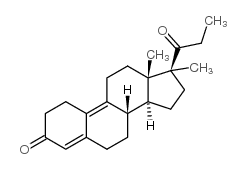Promegestone
Modify Date: 2025-08-23 22:36:58

Promegestone structure
|
Common Name | Promegestone | ||
|---|---|---|---|---|
| CAS Number | 34184-77-5 | Molecular Weight | 326.47200 | |
| Density | 1.09 g/cm3 | Boiling Point | 486.8ºC at 760 mmHg | |
| Molecular Formula | C22H30O2 | Melting Point | 152° | |
| MSDS | N/A | Flash Point | 180.4ºC | |
Use of PromegestonePromegestone (R-5020), a progestin, is a potent progesterone receptor (PR) agonist. Promegestone has the potential for endocrine regulation and cancer research[1]. |
| Name | promegestone |
|---|---|
| Synonym | More Synonyms |
| Description | Promegestone (R-5020), a progestin, is a potent progesterone receptor (PR) agonist. Promegestone has the potential for endocrine regulation and cancer research[1]. |
|---|---|
| Related Catalog | |
| In Vitro | Promegestone (R-5020; 1 nM) is efficient ligand with a full agonist response profile and a low EC50 of 0.33 nM) in HELN-hPR while it only partially induced luciferase activity in U2OS-zfPR (EC50=1.93 nM)[1]. Promegestone is inactive in HELN cells that express luciferase but no functional receptor[1]. Promegestone (10 nM) robustly stimulates SLC37A2 expression in cells expressing SUMO-deficient PR, but not in cells expressing WT PR in T47D cell models[3]. |
| In Vivo | Promegestone (R-5020; 8 mg/kg; intramuscularly)-treated pregnant mice on day 18 postbreeding has the least deterioration in extracellular collagen (lowest OD) and highest cell density compared to other groups on the day before birth[2]. |
| References |
| Density | 1.09 g/cm3 |
|---|---|
| Boiling Point | 486.8ºC at 760 mmHg |
| Melting Point | 152° |
| Molecular Formula | C22H30O2 |
| Molecular Weight | 326.47200 |
| Flash Point | 180.4ºC |
| Exact Mass | 326.22500 |
| PSA | 34.14000 |
| LogP | 5.17780 |
| Index of Refraction | 1.553 |
CHEMICAL IDENTIFICATION
HEALTH HAZARD DATAACUTE TOXICITY DATAMUTATION DATA
|
| R5020 |
| (8S,13S,14S,17S)-13,17-dimethyl-17-propanoyl-1,2,6,7,8,11,12,14,15,16-decahydrocyclopenta[a]phenanthren-3-one |
| Promegestona |
| Promegestone |
| 17,21-dimethyl-19-nor-4,9-pregnadiene-3,20-dione |
| RU5020 |
| Promegestonum |
| promegestrone |